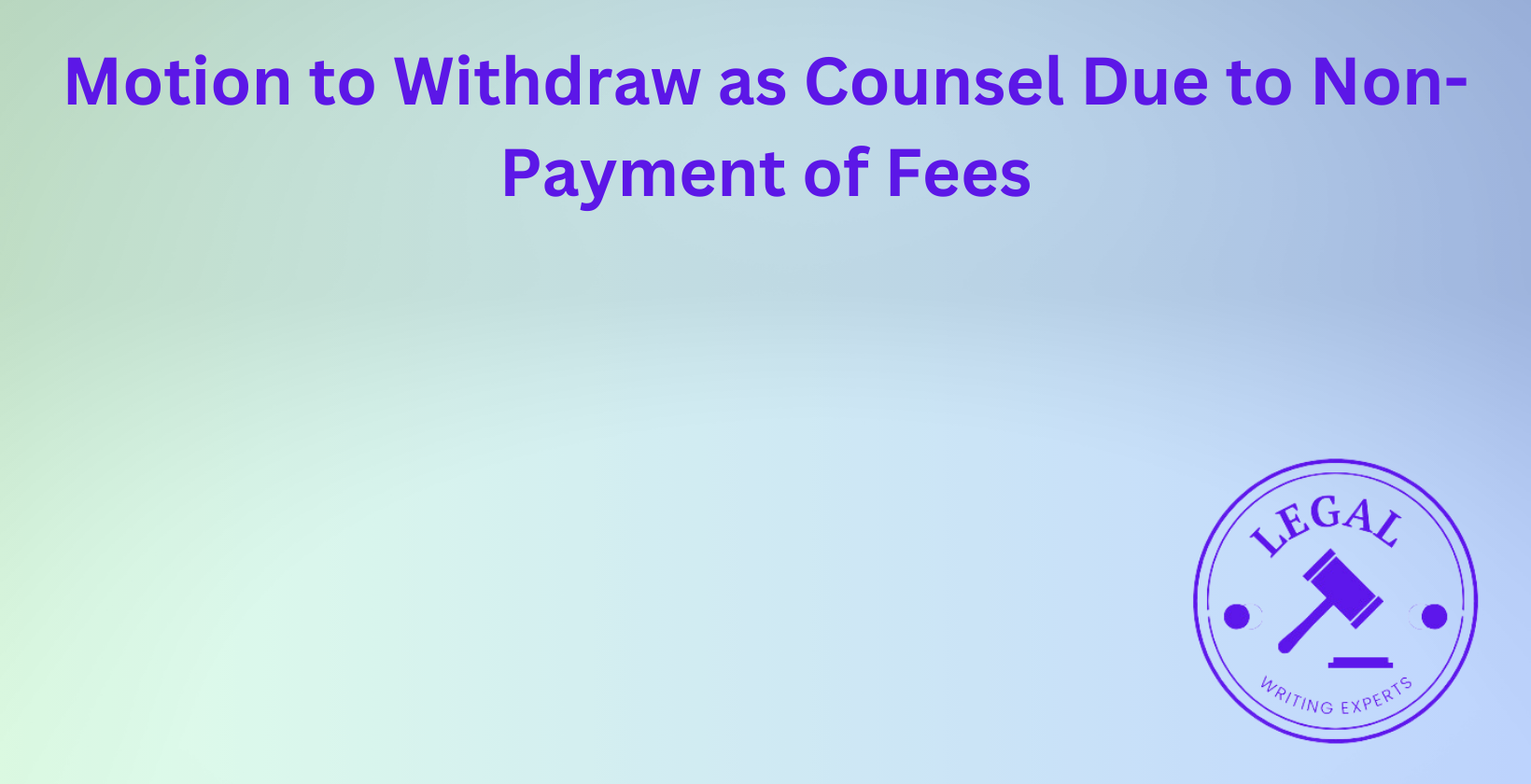Motion to Withdraw as Counsel Due to Non-Payment of Fees
Written by
Jessica E
February 19, 2025 · 8 min read

A motion to withdraw as counsel due to non-payment of fees is a formal legal request made by an attorney to terminate their representation of a client. Attorneys file this motion when clients fail to fulfill their financial obligations for legal services rendered. Courts evaluate these motions based on ethical considerations, procedural requirements, and the impact on the client’s legal rights. Understanding how to draft, file, and navigate the legal complexities of such a motion is essential for attorneys to remain compliant with professional conduct rules while protecting their interests.
What is a Motion to Withdraw as Counsel Due to Non-Payment of Fees?
A motion to withdraw as counsel due to non-payment of fees is a legal document submitted to the court requesting permission to cease representation of a client who has failed to pay for legal services. Attorneys have an ethical duty to provide competent representation, but non-payment can make continued legal assistance unsustainable. Courts typically approve withdrawal motions when attorneys demonstrate that they provided reasonable notice, made attempts to collect payment, and ensured that withdrawal does not unduly prejudice the client’s case.
How to Write a Motion to Withdraw as Counsel Due to Non-Payment of Fees?
To write a motion to withdraw as counsel due to non-payment of fees, attorneys must include specific legal elements. The motion should state the attorney-client relationship, the reason for withdrawal, compliance with ethical obligations, and the potential impact on the client’s case. Attorneys must ensure that the motion adheres to jurisdictional court rules and includes supporting documentation, such as invoices or correspondence showing efforts to collect outstanding fees. Legal document drafting services provide assistance in structuring a motion that meets procedural requirements while maintaining professional integrity.
Where to Hire a Legal Writer to Draft a Motion to Withdraw as Counsel Due to Non-Payment of Fees?
Legal writers specializing in legal drafting services can be hired through legal research companies, freelance legal research platforms, or legal document drafting service providers such as Legal writing Experts. Attorneys seeking assistance can hire a legal writer with expertise in lawyer legal documents to draft motions that comply with jurisdictional rules. Online legal document review services ensure that the drafted motion meets professional standards and enhances the likelihood of court approval.
How to File a Motion to Withdraw as Counsel Due to Non-Payment of Fees?
To file a motion to withdraw as counsel due to non-payment of fees, attorneys must follow court-specific procedures. The filing process involves submitting the motion to the appropriate court, serving a copy to the client, and, in some cases, notifying opposing counsel. Some jurisdictions require attorneys to schedule a hearing where they must demonstrate just cause for withdrawal. Legal document review services near me can assist attorneys in ensuring that filings comply with court requirements.
What Are the Ethical Considerations When Filing a Motion to Withdraw as Counsel Due to Non-Payment of Fees?
Ethical considerations when filing a motion to withdraw include maintaining client confidentiality, providing reasonable notice, and avoiding prejudicing the client’s case. Professional conduct rules require attorneys to ensure that withdrawal does not disrupt ongoing legal proceedings or harm the client’s legal rights. The American Bar Association’s Model Rules of Professional Conduct outline that attorneys should take reasonable steps to protect clients’ interests, such as providing necessary documents or allowing time for new representation.
What Are the Procedural Steps for Filing a Motion to Withdraw as Counsel Due to Non-Payment of Fees?
The procedural steps for filing a motion to withdraw include drafting the motion, filing it with the court, notifying the client, and, if required, attending a hearing. Courts may require attorneys to provide proof of communication with the client regarding unpaid fees. Attorneys must ensure compliance with jurisdictional rules by consulting legal research service providers or seeking legal document review online.
How Does Confidentiality Impact the Motion to Withdraw as Counsel Due to Non-Payment of Fees?
Confidentiality impacts a motion to withdraw by limiting the information attorneys can disclose regarding the client’s financial situation. Attorneys must avoid revealing privileged or sensitive information when citing non-payment as the reason for withdrawal. Courts generally permit attorneys to state non-payment without elaborating on specifics to protect client confidentiality.
What Are the Potential Consequences of Filing a Motion to Withdraw as Counsel Due to Non-Payment of Fees?
The potential consequences of filing a motion to withdraw include delays in court proceedings, additional costs for the client, and reputational risks for attorneys. Courts may deny withdrawal if it negatively affects the client’s ability to secure alternative representation or disrupts an ongoing case. Attorneys must balance their right to withdraw with ethical obligations to ensure a smooth transition for the client.
How Can Attorneys Protect Client Confidentiality When Filing a Motion to Withdraw Due to Non-Payment of Fees?
Attorneys can protect client confidentiality by using general language in the motion, avoiding the disclosure of case details, and following legal drafting service guidelines. Courts recognize the importance of client confidentiality and typically accept non-payment as a sufficient reason without requiring financial details.
What Are the Common Challenges Attorneys Face When Filing a Motion to Withdraw Due to Non-Payment of Fees?
Common challenges attorneys face when filing a motion to withdraw include court resistance to withdrawal, ethical concerns, and potential disputes with clients. Some courts require attorneys to continue representation until new counsel is secured, creating financial strain. Freelance legal research services can help attorneys prepare persuasive motions to address judicial concerns.
How Can Attorneys Ensure Compliance with Professional Conduct Rules When Filing a Motion to Withdraw Due to Non-Payment of Fees?
Attorneys can ensure compliance with professional conduct rules by providing sufficient notice, documenting attempts to collect payment, and following jurisdictional withdrawal procedures. Hiring a legal researcher can assist attorneys in understanding state-specific regulations and drafting motions that align with ethical guidelines.


